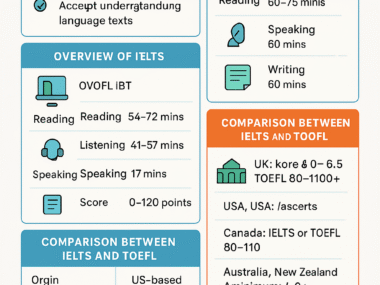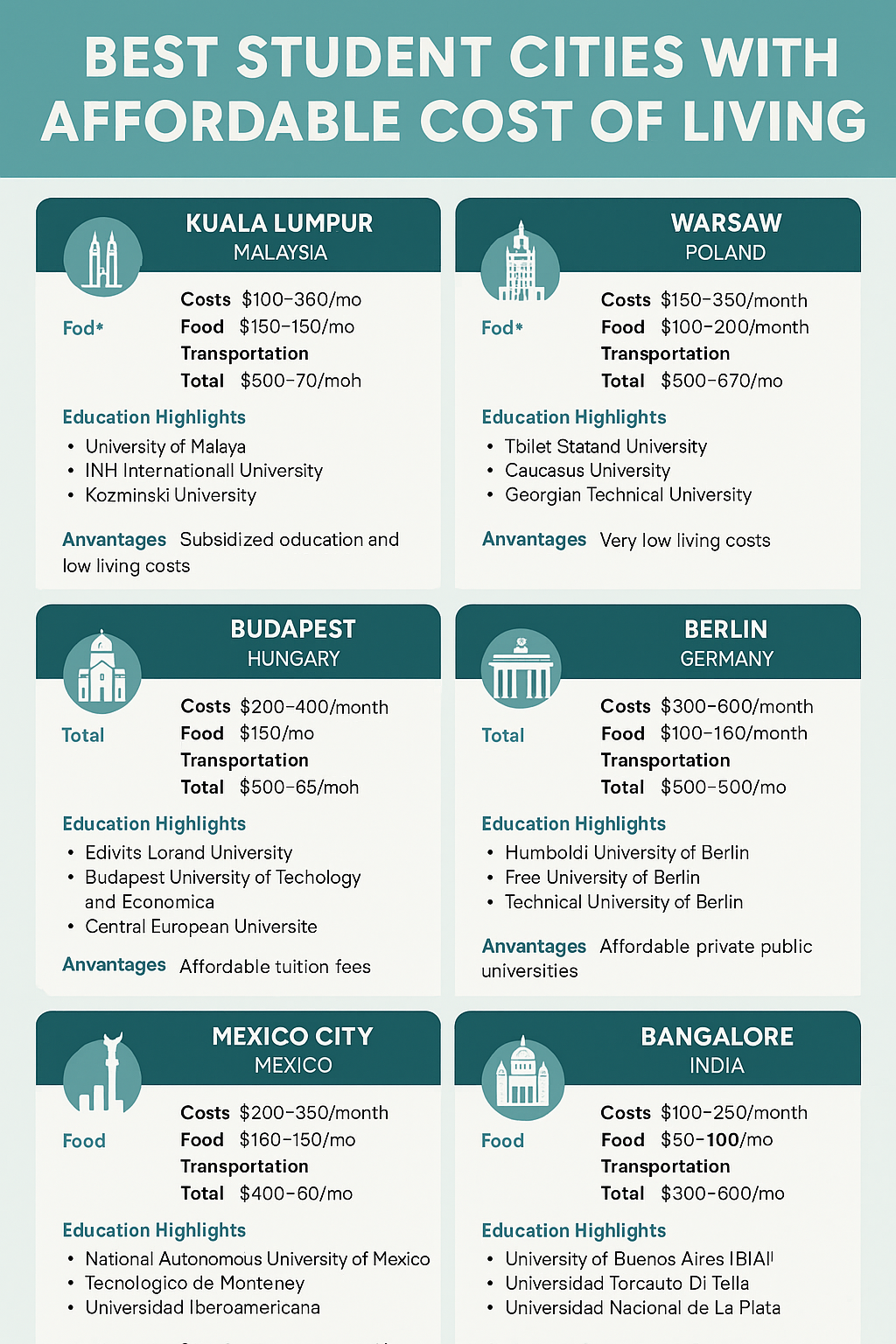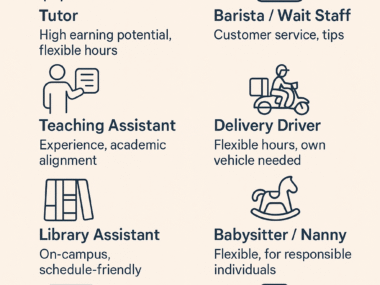Germany Free Education for International Students and Part-Time Jobs: A Comprehensive Guide
Introduction
Germany has emerged as one of the top global destinations for international students, thanks to its tuition-free education policy at public universities and ample part-time job opportunities that help students manage their living expenses. The country’s high-quality education system, research-oriented universities, diverse student community, and strong economy make it especially attractive for those seeking an affordable yet prestigious education in Europe.
This guide provides a comprehensive overview of free education in Germany for international students, covering eligibility, university admission, visa regulations, living expenses, and part-time job opportunities. Whether you’re planning a bachelor’s, master’s, or doctoral program, this write-up will help you understand the opportunities and responsibilities of studying and working in Germany.
Table of Contents
- Overview of Germany’s Education System
- Why Germany Offers Free Education
- Eligibility for Tuition-Free Education
- Structure of Higher Education in Germany
- Language of Instruction and Requirements
- Top Tuition-Free Universities in Germany
- Admission Requirements for International Students
- Application Process
- Student Visa Requirements and Rules
- Cost of Living in Germany
- Scholarships and Financial Aid
- Working While Studying: Part-Time Job Rules
- Types of Part-Time Jobs for Students
- Finding Jobs: Portals and Resources
- Taxes, Insurance, and Legal Aspects of Working
- Balancing Work and Studies
- Post-Study Work Opportunities
- Success Stories
- Challenges and How to Overcome Them
- Conclusion
1. Overview of Germany’s Education System
Germany’s education system is globally renowned for its academic rigor, emphasis on research, and technological innovation. The system includes:
- Public universities: Mostly tuition-free for all students, including internationals.
- Universities of Applied Sciences (Fachhochschulen): Focus on practical training and industry experience.
- Private institutions: Charge tuition fees but may offer specialized or niche programs.
2. Why Germany Offers Free Education
Germany’s decision to eliminate tuition fees for public higher education is rooted in:
- Education as a public good: The government views education as a right, not a privilege.
- Skilled workforce development: Free education encourages global talent to study, stay, and contribute to Germany’s economy.
- Equality and accessibility: Reduces financial barriers for both local and international students.
- Promotion of global cooperation: Enhances international reputation and soft power through academic collaboration.
3. Eligibility for Tuition-Free Education
To benefit from Germany’s free education:
- You must enroll in a public university.
- The course must be state-funded, not a private or executive program.
- You need a valid student visa or residence permit.
- You must meet academic entry requirements (varies by program).
- Some master’s programs may charge fees if your bachelor’s was obtained outside Germany.
Note: A semester contribution of €150–€350 is still required, which covers student services, public transportation, and administrative fees.
4. Structure of Higher Education in Germany
Germany follows the Bologna Process, making degrees comparable across Europe:
- Bachelor’s degree: 3–4 years
- Master’s degree: 1–2 years
- Doctorate (PhD): 3–5 years
Courses may be in German or English, depending on the program.
5. Language of Instruction and Requirements
- German-taught programs require proficiency in German:
- TestDaF, DSH, or Goethe-Institut certificates
- English-taught programs (especially at master’s level):
- IELTS (usually 6.5+), TOEFL, or PTE scores
German language proficiency is also helpful for part-time jobs and daily life.
6. Top Tuition-Free Universities in Germany
Some of the leading public universities offering free education include:
- Ludwig Maximilian University of Munich (LMU)
- Heidelberg University
- Humboldt University of Berlin
- University of Freiburg
- Technical University of Munich (TUM)
- RWTH Aachen University
- University of Stuttgart
- University of Hamburg
These institutions are globally ranked and offer a wide range of programs.
7. Admission Requirements for International Students
General Requirements:
- Valid secondary school diploma (for bachelor’s)
- Recognized bachelor’s degree (for master’s)
- Transcripts, CV, and letter of motivation
- Language test scores
- Letter(s) of recommendation
- Passport and photographs
Some programs may require additional entrance exams or portfolios (especially in arts/design).
8. Application Process
Step-by-Step:
- Select a course and university via DAAD or Hochschulkompass.
- Check eligibility via uni-assist.de (for many universities).
- Collect required documents.
- Apply online through the university portal or uni-assist.
- Await admission offer (takes 4–8 weeks).
- Apply for a student visa after receiving the offer.
9. Student Visa Requirements and Rules
Types of Visas:
- Student applicant visa: For applying or attending interviews.
- Student visa: For enrolled students.
Requirements:
- Admission letter
- Proof of funds (€11,208/year in blocked account)
- Health insurance
- Academic and language certificates
- Valid passport
- Visa application form
Visa holders must maintain full-time study, attend classes, and not exceed permitted work hours.
10. Cost of Living in Germany
While tuition is free, living expenses must be planned:
| Expense | Monthly Cost (EUR) |
|---|---|
| Accommodation | €250 – €500 |
| Food and groceries | €150 – €250 |
| Transport | €80 – €100 |
| Health insurance | €90 – €120 |
| Internet/Phone | €30 – €50 |
| Leisure | €50 – €100 |
Average monthly total: €800 – €1,200
11. Scholarships and Financial Aid
Even though education is free, you can apply for scholarships for living expenses:
- DAAD Scholarships
- Erasmus+
- Deutschlandstipendium
- University-specific scholarships
- Private foundations and political organizations
These scholarships offer monthly stipends between €300 and €1,200.
12. Working While Studying: Part-Time Job Rules
Germany allows international students to work part-time while studying:
- 120 full days or 240 half days per year
- Part-time jobs must not interfere with studies
- Students on language or preparatory courses: fewer hours allowed
EU/EEA students have fewer restrictions and can work up to 20 hours/week year-round.
13. Types of Part-Time Jobs for Students
Popular part-time jobs include:
- HiWi (Student Assistant): Working in university departments, labs, or libraries
- Tutoring: Private or online, especially in English or STEM subjects
- Cafés and restaurants: Waiters, kitchen help, cashiers
- Retail and supermarkets
- Delivery or logistics assistants
- Internships (paid and unpaid)
- Translation, writing, or graphic design (freelance)
Hourly wages range from €10 – €15, depending on job and city.
14. Finding Jobs: Portals and Resources
Job platforms and tools:
- Jobbörse der Bundesagentur für Arbeit (Federal Employment Agency)
- StepStone, Indeed, Monster Germany
- Studentenwerk job boards
- University career centers
- Social media and local job fairs
- Werkstudent roles (part-time student jobs in companies)
15. Taxes, Insurance, and Legal Aspects of Working
- If you earn more than €520/month, you may pay income tax.
- Students working more than 20 hours/week are liable for social contributions.
- All students must have health insurance (public or private).
- You may need a Tax Identification Number and German bank account.
Ensure your employment is compliant with visa regulations.
16. Balancing Work and Studies
Time management is key:
- Prioritize studies (attendance and grades are monitored)
- Avoid overworking during exams
- Work on weekends or evenings if possible
- Plan schedules with study and work in harmony
Avoid working night shifts regularly to maintain health and performance.
17. Post-Study Work Opportunities
Germany encourages international graduates to stay and work:
- 18-month job-seeking visa after graduation
- Can apply for EU Blue Card or work visa upon finding a job
- Graduates can apply for permanent residency after 2–4 years of employment
Fields like engineering, IT, business, and healthcare have high demand.
18. Success Stories
Thousands of international students have built careers in Germany:
- Engineers and IT professionals find employment quickly due to skills shortages
- Business graduates land roles in German companies or startups
- Researchers often transition into PhD or academic roles
- Many alumni go on to secure permanent residency or citizenship
These success stories illustrate how free education and part-time work build a strong foundation for a future in Germany.
19. Challenges and How to Overcome Them
Language Barrier:
- Learn basic German before arriving
- Enroll in university language courses
Cultural Adjustment:
- Join student clubs and orientation programs
- Connect with other international students
Financial Management:
- Budget wisely
- Use student discounts for travel, food, and entertainment
Bureaucracy:
- Apply early for visas and residence permits
- Use university international offices for guidance
Conclusion
Germany stands out as a beacon for accessible, high-quality, and affordable education. Its policy of tuition-free public university education for international students reflects its commitment to intellectual and cultural exchange. Coupled with the ability to work part-time, international students can achieve both academic and financial independence while preparing for a successful career.
While challenges exist—such as language barriers and navigating bureaucracy—these are outweighed by the benefits of world-class education, cultural richness, career opportunities, and a welcoming environment.
With proper preparation, a clear vision, and a willingness to adapt, studying and working in Germany can be one of the most rewarding decisions an international student can make.
![]()





